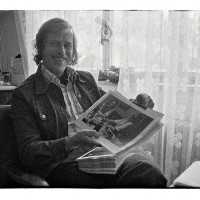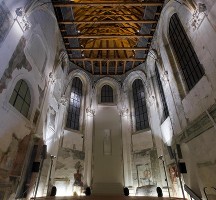Breadcrumbs navigation
Václav Havel's Prague
In October 2016, we commemorated the 80th birthday anniversary of Václav Havel, well-known dramatist, essayist and former president of the Czech Republic. Who was Václav Havel and what places is he associated with in Prague?
Note legal paragraphs, sabres that curl,
pay heed dear Havel, dear Havel, muse well!
Note legal paragraphs, sabres that curl,
pay heed dear Havel, dear Havel, muse well!
This chorus from a song by Jaroslav Hutka used to get sung around Prague with an air of mystery. That was before the Velvet Revolution of 1989. At that time Václav Havel’s name was far less known than it is today. Back then, Václav Havel was ‘merely’ a persecuted Czech dissident, a co-writer of the Charter 77 protest in Czechoslovakia, an author of little-known plays, which were only ever performed abroad. It didn’t take long, and the life story of Václav Havel changed immensely.
Today, Václav Havel is a world-renowned persona. Yet few of those arriving from abroad have any inkling about his life and family background. Havel’s family history is a rather interesting perspective on the 20th century, however.
Who was Václav Havel?
The last Czechoslovak and first Czech President, Václav Havel, was born in October 1936 into a prominent Prague entrepreneurial and intellectual family, owning several real estate properties in Prague. Most notable among them is the Lucerna palazzo, completed shortly after WWI in the close vicinity of Wenceslas Square, as well as the Barrandov Film Studios. Along with his brother Ivan, two years his junior, young Václav was raised in a loving and very vivacious family setting. His father, Václav Maria Havel, a successful structural engineer, was the second generation head of the family building development tradition. His mother, Božena, came from the Vavrečka family, with art-literary and technical talents. She no doubt represented a great role model for her sons, in whom she cultivated a freedom loving spirit, but also set the bar of aspiration high for them.
Václav Havel spent his youth under the WWII protectorate in the rural countryside.
At eleven years of age he became one of the boarders at a prestigious boarding school in Poděbrady, whose activities were however prematurely curtailed following the major political upheaval in the former Czechoslovakia of that time. After various vagaries of fate he finally managed to graduate from high school in 1954, taking evening classes at the Akademické gymnázium school in Štěpánská Street. He also trained as a lab assistant. He wanted to continue his studies, but the Humanities subject he chose at the Philosophical Faculty was unattainable for him, largely for political selection reasons. After getting turned down a second time he headed for the Economics Faculty of the Czech Technical University. He came to regard this move as a big mistake. He thus sought to transfer, to study at the Film Faculty of the Academy of Performing Arts. By this time he had begun to contribute to the literary magazine Květen (‘May’) and even took the stand with a rebellious speech at the conference of upcoming writers, that took place at the Chateau in Dobříš in 1956.
He spent his time writing and discovering the world of literature. He had the opportunity to make the personal acquaintance of Jaroslav Seifert, Vladimír Holan and Jiří Kolář. Each of these meetings was one piece of the mosaic that contributed to Václav Havel becoming a writer.
Like every young man, Václav Havel was to be conscripted for compulsory military service. He served for two years with the military engineers in České Budějovice, where he also acted and wrote his first ever stage play. This opened the doors to the profession he was to stay loyal to the rest of his life.
After returning to civilian life in 1959 he finally entered the milieu he had so completely fallen in love with. Initially working as a stage technician for Jan Werich in the ABC Theatre, he moved on after a few months to another of Prague’s smaller theatres. It was this ‘Theatre on the Balustrade’ which became a landmark venue for Václav Havel, for several reasons. The diverse and culturally rich nineteen-sixties brought a certain degree of political free reign. Although Havel was once again engaged as a stage technician, he soon got involved in dramaturgy and eventually became assistant director. In parallel with his job he studied dramaturgy at the Academy of Performing Arts Theatre Faculty. This was to do with the fact that in 1963 the Theatre on the Balustrade staged his own play “The Garden Party” and three years later he published his first book, “Protocols”. What is more, he got married. Olga Šplíchalová became Václav Havel’s wife in 1964. Olga, three years older and from a completely different background, with quite different life experiences, was to become his life’s stronghold later on.
The Warsaw Pact invasion of 21 August 1968 brought to an end not only the political Prague Spring, but also brought with it a harsh reality that changed many people’s lives. One such was Václav Havel, who had greatly engaged himself in the reform process with his writings and politically. This fact was to cause him many consequent problems. After Czechoslovakia had once again fallen under the yoke of the conservative Communist leadership, with some one hundred thousand members of the Red Army remaining stationed there, Václav Havel was charged with subversion. From his position of a “freelance” writer, or as a labourer in the Trutnov Brewery, he kept his independence. Through several open letters addressed to leading Communist ruling officials he tried to draw attention in particular to the need to respect human rights and to release Czechoslovakia’s political prisoners.
The key event was the writing of Charter 77. This was essentially a grass-roots initiative on the one hand, criticizing how the ruling party was wielding power, and on the other hand and appeal to uphold the commitments of the International Conference in Helsinki, which prominently featured human rights and became a thorn in the side of the Communist regime. Václav Havel as co-author also played an important role as the press spokesman for this initiative to the outside world. He did not have long to wait for repercussions from the powers-that-be. In 1979, Václav Havel was convicted of subversion and sentenced to four and a half years in prison, unconditionally, having already received a prior conditional sentence of 14 months. After his release, he was under the constant supervision of the secret police, the StB.
Yet the persecution and pressure on Václav Havel in the 1980s did nothing to prevent the further active participation of Havel the writer and Havel the playwright. Thanks to significant support from abroad, where the plays he wrote during the ‘normalization’ clampdown were being performed, e.g. “A Hotel in the Hills”, “Largo desolato”, and “Temptation”, Václav Havel became a symbol of Czech chartists and Czech dissent. He also greatly helped out with samizdat publications. In January 1989 he was of course active when it came to Palach week, which was to mean another bout of incarceration. The subsequent Europe-wide events of that year, the fall of the Berlin wall, the events of 17 November, the Velvet Revolution in Czechoslovakia and the formation of the Civic Forum prepared the ground for political negotiations that propelled Václav Havel into the role of the new Head of State. Václav Havel remained in this role, through times of intricate and complex changes and processes, for almost thirteen years.
Places associated with Václav Havel in Prague
- Prague Castle, in particular the 3rd Courtyard – balcony, 2nd Courtyard – entrance to the Presidential Office, the Presidential election venues – Vladislav Hall, Spanish Hall
- The Lví dvůr (Lion’s Court) restaurant
- Divadlo Na zábradlí (The Theatre on the Balustrade)
- Činoherní klub (The Drama Club)
- Divadlo ABC (ABC Theatre)
- Prague crossroads – the former Church of St. Anna
- Café Slavia
- Národní boulevard – Adria palazzo – National Theatre – Laterna Magika
- Ulice 28. října (28th October street) – Špalíček theatre – Civic Forum
- Wenceslas square – the Federal Assembly (later Radio Free Europe), the Melantrich palazzo, Lucerna palazzo, Můstek
- The Štěpánská Gymnázium school
- ČVUT (Czech Technical University)
- FAMU, Smetanovo embankment (Film Academy)
- DAMU, Karlova 26 (Theatre Academy)
- Bartolomějská street – interrogations
- The Municipal House – Blue dining room
- The Offices of the Government – Straka Academy
- The Chamber of Deputies
- Wallenstein Palace
- The S1 lounge at the ‘Palace of culture’ (Congress Centre)
- The Dancing House – Rašínovo embankment
- House Nr. 2000/78 on Rašínovo embankment
- Vinohrady Theatre
- The Hospital in Londýnská street, Prague 2, Vinohrady
- Pankrác prison
- Ruzyně prison
- Vinohrady cemetery
- VIZE 97 foundation – Voršilská 10, Prague 1
- The Václav Havel Library – Ostrovní 13, Prague 1
- Reduta Jazz Club
- U Zlatého tygra (pub)
- Letná plain
- Škroupovo square, Prague 3
- The French Embassy – Buquoy palazzo, Velkopřevorské square, Prague 1
- Prague 6, Dělostřelecká 1/654
- Žižkov Town Hall

